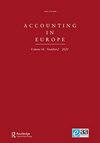The Predictors of Non-Financial Reporting Quality in Romanian State-Owned Enterprises
IF 4.3
Q1 BUSINESS, FINANCE
引用次数: 8
Abstract
ABSTRACT This paper focuses on the predictors of non-financial reporting (NFR) quality by state-owned enterprises (SOEs). The predictors under consideration are the quality of the corporate governance system (assessed through a comprehensive index), state ownership concentration, industry sector characteristics, and company size. Our cross-sectional sample consists of data for 63 state-controlled enterprises in Romania for the financial year 2018. The data were collected by hand, using two new instruments: a content analysis scale for NFR according to the European Directive 2014/95/EU and a corporate governance index for SOEs. We classify Romanian SOEs into two clusters: ‘high disclosure – good governance’ and ‘low disclosure – poor governance,’ for which we present the particularities of NFR and corporate governance. In line with agency theory and stakeholder theory, we show that the NFR quality score is positively correlated with the corporate governance score, company size, environmental impact, monopolistic position, and the state’s strategic interest, but negatively correlated with state ownership concentration. Our results also indicate that an increase in the state’s blockholding will negatively affect the quality of the corporate governance system, and will ultimately decrease the quality of the company’s non-financial disclosures. We conclude that the quality of the governance system is a mediating variable between the state’s ownership concentration and the quality of NFR. Our results are helpful to professionals and policymakers in understanding the path toward the material harmonization of reporting practices at a European level for SOEs and private entities alike.罗马尼亚国有企业非财务报告质量的预测因素
摘要本文主要研究国有企业非财务报告质量的预测因素。所考虑的预测因素是公司治理体系的质量(通过综合指数评估)、国有股权集中度、行业特征和公司规模。我们的横断面样本包括罗马尼亚63家国有企业2018财年的数据。这些数据是使用两种新工具手工收集的:根据欧洲指令2014/95/EU的NFR内容分析量表和国有企业的公司治理指数。我们将罗马尼亚国有企业分为两类:“高披露-良好治理”和“低披露-不良治理”,我们介绍了NFR和公司治理的特殊性。根据代理理论和利益相关者理论,我们发现NFR质量分数与公司治理分数、公司规模、环境影响、垄断地位和国家战略利益呈正相关,但与国家所有权集中度呈负相关。我们的研究结果还表明,该州整体持股的增加将对公司治理体系的质量产生负面影响,并最终降低公司非财务披露的质量。我们得出的结论是,治理体系的质量是国家所有权集中度和NFR质量之间的中介变量。我们的研究结果有助于专业人士和政策制定者了解在欧洲层面实现国有企业和私营实体报告实践实质性协调的途径。
本文章由计算机程序翻译,如有差异,请以英文原文为准。
求助全文
约1分钟内获得全文
求助全文

 求助内容:
求助内容: 应助结果提醒方式:
应助结果提醒方式:


